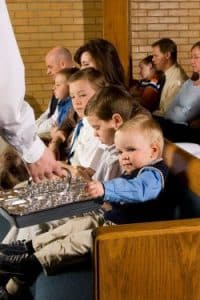Most of the Sabbath lessons I’ve been to at Church focus on what we should not do on the Sabbath. This can create some tension in a classroom (or among family members) when people feel that different things detract from the Sabbath. Instead of making lists of what not to do, I think inviting the class to engage in a more positive discussion where people share what they do on the Sabbath that they find uplifting, fulfilling, and nourishing.
As I usually do, I have put the topic headings from the manual in bold, direct quotes or summaries from the manual in regular font, and questions to ask the class in italics.
Please feel free to add any suggestions for how you will teach this lesson in the comments below.
The Meaning of the Sabbath Day
We rest on the 7th day of the week because that is what God did after God created the world.
What does the Sabbath day mean to you?
The Purpose of the Sabbath Day
The primary purposes of the Sabbath are:
1) To rest from our everyday activities and prepare for the upcoming week
2) To worship God
3) To renew ourselves spiritually
What other reasons do you have for keeping the Sabbath day differently than the other days of the week?
I recently read a book by a Jewish psychologist, Wendy Mogel, called The Blessing of a Skinned Knee, which talks about how to raise children with Jewish teachings. One of my favorite chapters talked about how to help children realize the importance of Shabbat (or Sabbath) observance. I love this part:
Vayinafash means (that God created the world and then) He rested. The root of the term vayinafash is nefesh, soul. Each week, God commands that we take time to renew our souls by setting aside one day to rest from our usual routines.
With this definition in mind, what changes can you incorporate into your family schedule to provide time to rest and renew your soul on the Sabbath?
Keeping the Sabbath Day Holy
This is the section where I would work hard to get people to dig deeper…instead of naming what we can’t or shouldn’t do, I’d like to get the class talking about what renews them. I would start the discussion with a personal example or the following:
Every Sunday after church, Wendell Berry, a prolific writer of all genres, would walk the grounds of his Kentucky farm and then, write. The end result is a collection of poetry called, A Timbered Choir: the Sabbath Poems 1979-1997. In this collection, Berry’s poems show how worship and spiritual renewal can occur for both the author and the reader. Here is an example:
A gracious Sabbath stood here while they stood
Who gave our rest a haven.
Now fallen, they are given
To labor and distress.
These times we know much evil, little good
To steady us in faith
And comfort when our losses press
Hard on us, and we choose,
In panic or despair or both,
To keep what we will lose.
For we are fallen like the trees, our peace
Broken, and so we must
Love where we cannot trust,
Trust where we cannot know,
And must await the wayward-coming grace
That joins living and dead,
Taking us where we would not go–
Into the boundless dark.
When what was made has been unmade
The Maker comes to His work.”
What do you do on the Sabbath to find rest, renewal, and spiritual understanding? Has there been a Sabbath day in your life that you’ve found particularly exemplary? Why?Blessings for Observing the Sabbath
What blessings have you seen when you or others observe the Sabbath?
Close with testimony.
Note: This lesson was originally written for the Relief Society audience in 2010-2011, when the Gospel Principles manual was temporarily used as curriculum for Relief Society, Elders Quorum and High Priest classes. The lesson may require adaptation for Gospel Principles classes, which are mixed gender and primarily serve new members and investigators of the church.







4 Responses
[…] EmilyCC’s RS Lesson: “The Sabbath” […]